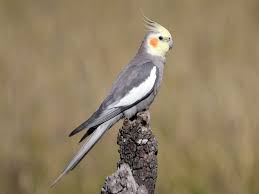
Cockatiel
Conditions of detention
Cockatiels require a spacious cage that allows for movement and flight. The cage should have horizontal bars for climbing and be equipped with perches, toys, and a variety of enrichment activities. It’s important to place the cage in a well-lit area, away from drafts and direct sunlight, to provide a stable environment.
Useful Fact: Cockatiels enjoy being part of the household activity, so placing their cage in a room where the family frequently gathers can provide social interaction and stimulation.
Nutrition and diet
A balanced diet for cockatiels includes high-quality pellets, fresh fruits, vegetables, and a small number of seeds. Leafy greens, carrots, apples, and sweet potatoes are excellent choices to provide essential nutrients.
Useful Fact: While seeds are a popular part of a cockatiel’s diet, they should not be the sole component, as they can lead to nutritional imbalances. Offering a variety of foods helps ensure a balanced diet.
Health
Cockatiels are generally healthy birds but can be prone to certain health issues, such as respiratory infections, obesity, and feather plucking. Regular veterinary check-ups are important to monitor their health and catch potential problems early.
Useful Fact: Keep an eye on your cockatiel’s droppings; changes in color or consistency can indicate health issues that require attention.
Grooming and care
Cockatiels engage in regular preening to maintain their feathers but also enjoy bathing. Providing a shallow dish of water for bathing or misting them with water can help keep their feathers in good condition.
Useful Fact: Regularly trimming their nails and providing cuttlebone or mineral blocks can help keep their beaks and nails in good shape.
Education and training
Cockatiels are intelligent and can be trained to perform simple tricks, step onto a finger, and mimic sounds. Positive reinforcement, patience, and consistency are key to successful training.
Useful Fact: Start training sessions when your cockatiel is calm and attentive, keeping sessions short (5-10 minutes) to maintain their interest.
Toys and entertainment
Toys are essential for the mental stimulation and well-being of cockatiels. They enjoy a variety of toys, including swings, bells, and puzzles. It is important to rotate toys regularly to keep them engaged.
Useful Fact: Foraging toys can provide mental stimulation by encouraging natural behaviors like searching for food, which can help prevent boredom and related behavioral issues.
Safety
Safety considerations include ensuring that the cage is free of sharp edges and that the bar spacing is appropriate to prevent escape or injury. Keep them away from toxic substances, including certain household plants and fumes.
Useful Fact: Avoid using non-stick cookware around cockatiels, as the fumes can be toxic and even fatal to birds.
Accessories
Cockatiels require a variety of accessories for their cage, including perches, food and water dishes, and toys. Accessories should be made from safe materials like untreated wood or stainless steel.
Useful Fact: Providing perches of different diameters can help maintain foot health by preventing pressure sores and promoting natural exercise.
Socialization
Cockatiels are social creatures and thrive on interaction with humans and other birds. They should not be kept in isolation for extended periods.
Useful Fact: Spending time with your cockatiel daily helps fulfill their social needs and strengthens the bond between you and your bird.
Travel and Transportation
When traveling with cockatiels, use a secure and well-ventilated travel cage. It’s important to keep the cage covered during transport to reduce stress.
Useful Fact: Familiarize your cockatiel with the travel cage by placing it in their living space and allowing them to explore it before any trips.
Behavior and psychology
Cockatiels exhibit a range of behaviors and vocalizations that indicate their mood and health. Understanding these signals is essential for proper care.
Useful Fact: A happy cockatiel will often whistle, chirp, and show interest in its surroundings, while a stressed or unhappy bird may become quiet or exhibit signs of distress like pacing or feather plucking.
Legal aspects
In most areas, there are few legal restrictions on keeping cockatiels as pets, but it is important to ensure that any cockatiels purchased are from reputable breeders or pet stores, and not taken from the wild.
Useful Fact: Always check local regulations to ensure compliance with laws regarding pet ownership and breeding.


